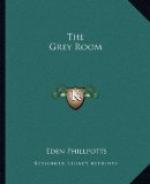Henry Lennox ventured to bring him back to the point.
“What knowledge—what particular branch of information should a man possess, signor, to find out what you have found?”
“Merely an adornment, my young friend, a side branch of withered learning, not cultivated, I fear, by your Scotland Yard. Yet I have known country gentlemen to be skilled in it. The practice of heraldry. I marked your arms on your Italian gates. I must look at those gates again—they are not very good, I fear. But the arms—a chevron between three lions—a fine coat, yet probably not so ancient as the gates.”
“It was such a thing as bothered me in Florence,” said Sir Walter. “I’d seen it before somewhere, but where I know not—a bull’s head of gold on a red field.”
Signor Mannetti started and laughed.
“Ha-ha! We will come to the golden bull presently, Sir Walter. You shall meet him, I promise you!”
Then he broke off and patted his forehead.
“But I go too quickly—far too quickly indeed. I must rest my poor brain now, or it will rattle in my head like a dry walnut. When it begins to rattle, I know that I have done enough for the present. May I walk in the garden again—not alone, but with your companionship?”
“Of course, unless you would like to retire and rest for a while.”
“Presently I shall do so. And please permit nobody to enter the Grey Room but myself. Not a soul must go or come without me.”
Sir Walter spoke.
“You still believe the peril is material then—an active, physical thing, controlled by a conscious human intelligence?”
“If I am right, it certainly is active enough.”
They went into the garden, and Signor Mannetti, finding a snug seat in the sun, decided to stop there. Henry and his uncle exchanged glances, and the latter found his faith weakening, for the Italian’s mind appeared to wander. He became more and more irrelevant, as it seemed. He spoke again of the old dog who was at his master’s feet.
“Euthanasia for the aged. Why not? For that matter, I have considered it for myself in dark moments. Have you ever wondered why we destroy our pets, for love of them, yet suffer our fellow creatures to exist and endure to the very dregs Nature’s most fiendish methods of dissolution? Again one of those terrible problems where mercy and religion cannot see eye to eye.”




